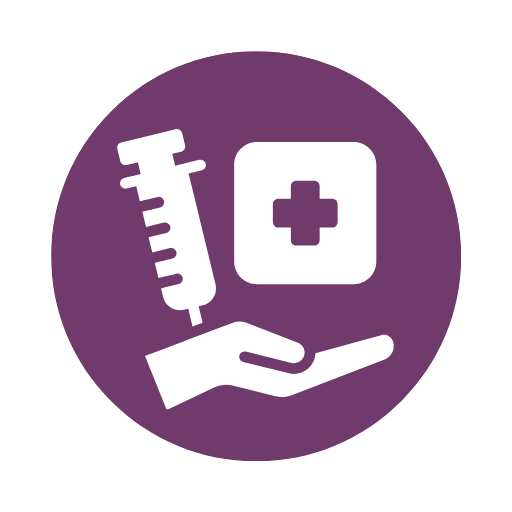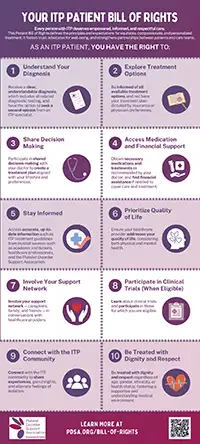PDSA believes every person living with ITP deserves the knowledge, tools, and support to navigate their health journey with confidence. That’s why we’ve created the ITP Bill of Rights – a powerful resource designed to empower you to advocate for your needs, make informed decisions, and partner effectively with your healthcare team.
Living with ITP can feel overwhelming, but knowing your rights as a patient is the first step in taking control of your care. The ITP Bill of Rights outlines the essential principles that ensure your voice is heard, your choices are respected, and your quality of life is prioritized. Whether you're newly diagnosed or managing ITP long-term, these rights provide a foundation for informed, compassionate care that aligns with your individual goals and values.
Download the ITP Bill of Rights and join PDSA in creating a future where every ITP patient is equipped to thrive.
As an ITP patient, you have the right to:

- Be given the full scope of relevant diagnostic testing available to ensure an accurate diagnosis.
- Receive a clear, understandable explanation of your ITP diagnosis, including how it affects your body and overall health.
- Have the freedom to seek a second opinion from an ITP specialist to ensure confidence in your care plan.

- Learn about all ITP treatments from first and second-line therapies to more advanced options.
- Discuss the benefits, risks, and potential side effects of each treatment to make informed decisions about your care.
- Ensure your treatment plan aligns with your lifestyle and is not dictated by your insurance company or physician preferences.

- Collaborate with your doctor to create a treatment plan that reflects your health goals and personal lifestyle.
- Voice your preferences and concerns openly to ensure your treatment aligns with what matters most to you.
- Find a hematologist that listens to your concerns, needs, and is open to making decisions with you, not for you.

- Receive timely and appropriate treatments as recommended by your doctor, free from unnecessary insurance restrictions.
- Explore programs and resources for financial assistance to help cover the costs of medications, treatments, and related care.

- Access reliable, up-to-date information from trusted sources, including healthcare professionals, academic institutions, and patient advocacy organizations like PDSA.
- Empower yourself with education about ITP to better understand and manage your condition.
- Explore well-established treatment guidelines to help determine the appropriate treatment plan for your unique ITP case.

- Ensure your healthcare provider addresses your overall well-being, including emotional and mental health, in addition to platelet counts.
- Advocate for care that considers your physical comfort, fatigue and energy levels, and ability to live life to the fullest.
- Understand potential side effects of treatments and how they might impact your lifestyle.

- Invite caregivers, family members, and friends to participate in discussions with healthcare providers to better support your journey.
- Share your experiences and goals with those closest to you to create an informed network of support.

- Learn about clinical trial opportunities, including their benefits, risks, and eligibility requirements.
- Participate in trials that may provide access to new treatments and contribute to advancements in ITP research.

- Join a supportive network of ITP patients to share experiences, learn coping strategies, and build lasting connections.
- Discover how others manage their condition to gain inspiration and reduce feelings of isolation.

- Receive respectful, compassionate care that values your individuality and promotes a safe, inclusive environment.
- Advocate for equitable treatment regardless of your age, gender, ethnicity, or health status.
- Recognize that ITP impacts people across all ages and life stages, from young children and teens to adults, to pregnancy, and receive appropriate care for your unique needs.


